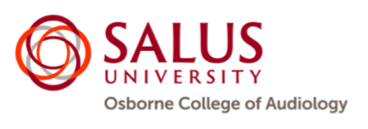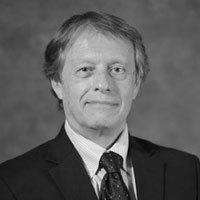Audiology Distance Education Opportunities from Salus University
What types of audiology distance education programs does Salus offer? Who can participate? 

Girija Sundar, PhD: Salus University Osborne College of Audiology offers five different distance education programs:
- Advanced Studies Certificate Programs: These programs are designed for US and international audiologists who want to gain both, depth and breadth of knowledge and expertise, in specific sub-specialties in audiology. The current advanced studies certificate programs we offer are in Cochlear Implants, Vestibular Sciences and Disorders, and Tinnitus and Hyperacusis. Each of these online programs consist of 6 to 8 courses and are typically completed in 6 to 8 months.
- AuD Degree Bridge Program: This program of study is for audiologists with a master’s degree in audiology and at least 3-years of post-master’s clinical work in audiology. The international AuD-Bridge degree program curriculum consists of 28 didactic courses and two hands-on workshops. We offer two courses per session and each session requires 6-weeks to complete.
- International MSc in Clinical Audiology: The newest program of study at Salus University leads to a Master of Science in Clinical Audiology. It is a post-professional degree program intended for audiologists who have completed a four-year undergraduate degree in audiology or its equivalent and have been providing clinical audiology services for no less than three years. The course of study for the Master of Science in Clinical Audiology expands on the knowledge and proficiency of clinical learning to cover evidence-based skills consistent with advancing sciences in clinical audiology as well as within specific disciplines of audiology. Requirements for the MSc Degree include three Advanced Studies Certificate Programs and three hands-on workshops. The MSc program is both competency and skills-based and is intended to help practicing audiologists gain mastery over specialized areas of practice.
- Summer Workshops: These intensive, four-day workshops combine lectures and hand’s-on laboratory experiences. The goal of the workshops is to provide an update on advanced and current science in the specific topic of study for the workshop, to review clinical implications, and to provide hands-on training using the tools and techniques discussed to improve clinical practice. The workshops are designed to have an immediate impact on the participant’s clinical service delivery and are taught by faculty who are distinguished by their expertise
Can master's level audiologists obtain an AuD via distance learning?
Dr. Sundar: Yes indeed. The International AuD Degree Bridge Program is for practicing audiologists with a master’s degree in audiology and audiologists will need to have completed at least 3-years of post-masters clinical work in audiology. You will find all the details for admissions into the program here.
Do the distance learning programs require face time at Salus or are they 100% online?

James W. Hall III, PhD: The AuD-Bridge degree program and the International MSc curriculum consists of didactic courses and hands-on face-to-face workshops. The workshops are held at the Salus University campus in Elkins Park, Pennsylvania in the month of July every year. The on-campus workshops are also open to audiologists anywhere who are not enrolled in any of the distance education programs at Salus University. One workshop is held outside the country almost every year. In August 2018, a Vestibular and Balance Disorders Workshop is being held in collaboration with National Institute for Speech and Hearing (NISH) in Trivandrum, India.
What is the time commitment for the programs, both the length of the programs as well as the number of participation hours required for each course? Are they achievable for busy, working professionals who may have other careers and families, etc?
Dr. Hall: All the Distance Education programs in the Osborne College of Audiology are delivered along the same delivery model. Each course is 6-weeks long and prior to each week the instructor uploads one 2-hour narrated PowerPoint lecture for students to listen to and view. We use the Salus University Web-Based Black Board Platform to deliver all our asynchronous online courses. In addition to uploading the pre-recorded lectures, instructors post threaded discussion topics each week and instructors communicate with the students all through the week via discussion board. Students need to set aside a minimum of 3 hours/week per course to download the lectures, listen to them, participate in threaded discussions and complete the weekly quiz. Almost all 6-week courses yield 1.5 Semester Credits.
Tell me about the Salus faculty - what type of experience, expertise, teaching style(s) do they have?
Dr. Sundar: The faculty in all the Distance Education Programs in the Salus University Osborne College of Audiology are leading academics and professionals mostly from the USA and Canada, who have demonstrated expertise in their field of study, are internationally recognized and have contributed significantly to the knowledge base in their areas of their interest and specialization. Faculty includes Dr. Hall as well as other notable instructors - they are all listed on our website.
How do students in distance learning programs interact? Are there group projects? Are there opportunities to support one another?
Dr. Hall: Threaded discussions offer students an opportunity to communicate with each other. We have found that our annual workshops contribute to a unique type of solidarity amongst the students. Many of them stay in touch with each other as well as with the faculty, even after they complete the distance education programs. And, interestingly, many former students return for the annual workshops even after completing their AuD!
Is financial aid available?
Dr. Sundar: We participate in the OSAP (Canada) program. Also, our financial aid department at Salus University is available to offer guidance to interested prospective or enrolled students.
Tell me about the application process for the various programs. What is expected and how long in advance is it recommended to apply?
Dr. Sundar: The application process for international students requires transcript credentialing (WES or other academic credentialing agencies). Prospective students are required to complete a accepted English proficiency exam (e.g., TOEFL or IELTS). It is best to allow three months to get this process completed. Domestic students find the process faster provided they follow these institutional application procedures.
Why Salus? What makes Salus unique or stand out?
Dr. Hall: Salus University has been a leader in innovative ways of delivering education with a commitment to professional and personal education. The distance education programs are directed at providing access to educational choices for post-professionals, and as such practicing audiologists who wish to stay current with rapidly advancing techniques and innovations. The overall objective of the unique programs is to enhance the professional and clinical capabilities of practicing audiologists so that they can stay abreast of advances in theoretical, diagnostic and rehabilitation issues in auditory science and audiology.
Dr. Sundar: At every level, our instructors strive to enhance clinical knowledge and skills so the audiologists enrolled as Salus students can apply data-driven, relevant, useful and recent techniques to their clinical practice. At the end of the day, our goal is to assure that practicing audiologists provide the best care possible to their patients. Salus University Osborne College of Audiology is committed to that objective and the Distance Education Programs allow us to open the doors of our educational initiatives to audiologists across the world!
Tell me about some of the opportunities students have had/may have after completing these programs. How does Salus support new grads?
Dr. Sundar: Many of our students have gone on to get their professional credentials, such as certification, and become members of American Academy of Audiology (AAA). Importantly, many Salus audiology graduates have also initiated innovative programs of their own in their home country. We support our graduates by helping them in any way we can to as they begin contributing to the profession at large.
Thank you both for your time today. More information is available at the links in this article, or by visiting the Salus University Osborne College of Audiology website.

